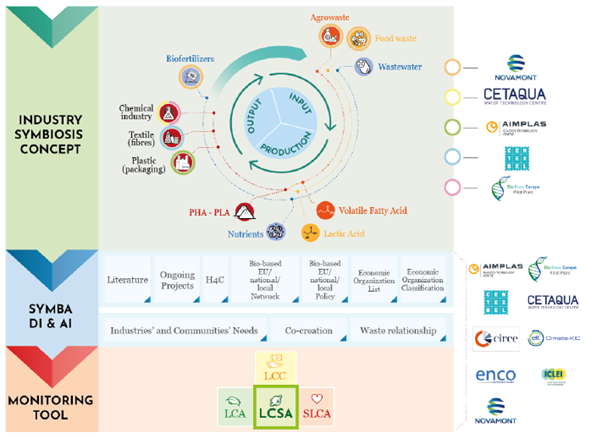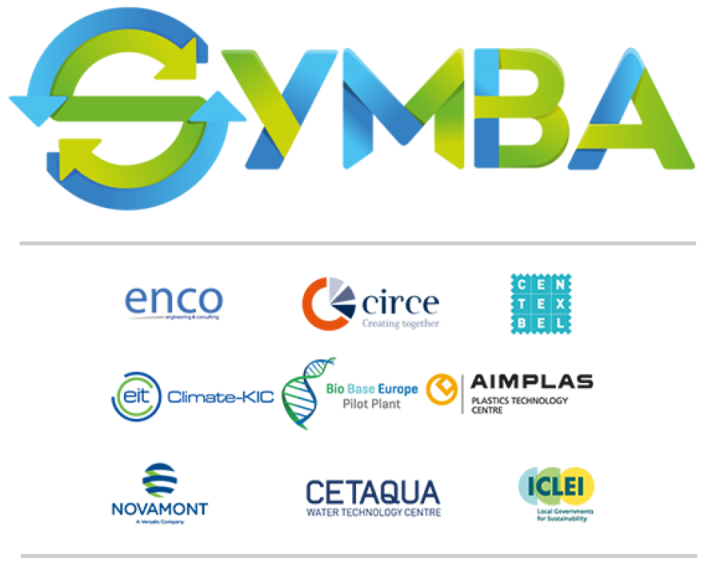Securing local supplY chains via the development of new Methods to assess the circularity and symbiosis of the Bio-bAsed industrial ecosystem enhancing the EU competitiveness and resource independence
The SYMBA project aims at creating a new and innovative IS method to be replicated within EU according to the local/regional bio-based industrial ecosystem. SYMBA will implement a user-friendly and accessible AI database suggesting innovative regional IS processes to create zero-waste value chains, ensuring more local supply chains; a better distribution of economic and social benefits among the stakeholders and an increase in the economic value of final products.
Industrial Symbiosis (IS) is a systemic approach that promotes sustainability by keeping resources in productive use, increasing their value, and moving waste and residuals up the value chain. The approach follows the 4R hierarchy of Reduce, Reuse, Recycle, and Recover, providing resource and energy-saving alternatives to traditional production management.
IS is central to the transition towards a circular economy and is one of the most effective ways to address resource scarcity and environmental pollution.
SYMBA solution, aligned with the EU Bioeconomy Strategy, is based on a threefold approach:
- Creation and validation of new IS methodology for the bio-based sector, starting from existing knowledge and lessons earned from SYMBA consortium partners.
- Individuation of criteria to select regional hubs.
- AI database including Monitoring tools, waste relation matrix, networking and cooperation with ongoing EU and local networks.

The project has the following objectives:
- Mapping and assessing current IS methods and approaches within the bio-based and non-bio-based industries around Europe
- Implementing an innovative IS monitoring system through the support of digital innovation and AI tools
- Minimizing negative socio-economic and environmental impacts of industrial products’ processes, and improving and optimizing the local supply chains by decreasing impacts on soil, water, air quality, biodiversity and climate.
- Supporting local facilitators in the promotion of a new bio-based IS initiatives.
- Establishing a roadmap for the replication of the SYMBA methodology in other regions by setting up synergies with existing initiatives
- Individuating criteria for the selection of specific industrial hubs for SYMBA replicability
- Accelerating regional, rural, local/urban and consumer-based transitions by developing innovative and sustainable value chains
- Involving and cooperating with clusters and existing initiatives
- Developing circular business models to ensure the long-term sustainability of the SYMBA methodology
- Creating awareness among stakeholders
Partners

The partnership is Coordinated by ENCO SRL and includes nine partners with complementary competences:
4 RTD centers (CIRCE, Centexbel, AIMPLAS; CET); 1 large industry (NVMT); 1 pilot facility (BBEPP); 1 innovative SME (ENCO) and 2 networks (CKIC and ICLEI) with a valuable background in applying IS approach in the bio-based sector, providing services to companies and creating awareness and networking among citizens, policy makers, EU initiatives.
Through the involvement of different industrial sectors: agri-food (NVMT); packaging (AIMPLAS); wastewater (CET); textile (Centexbel); waste valorisation (BBEPP), SYMBA will demonstrate how to shift from a linear to a circular economy contributing to deliver bio-based solutions with reduced environmental impacts on soil, water and air quality.
Aknowledgements
This Project has received funding from the European Union’s Horizon Research and Innovation Programme under Grant Agreement N. 101135562.





